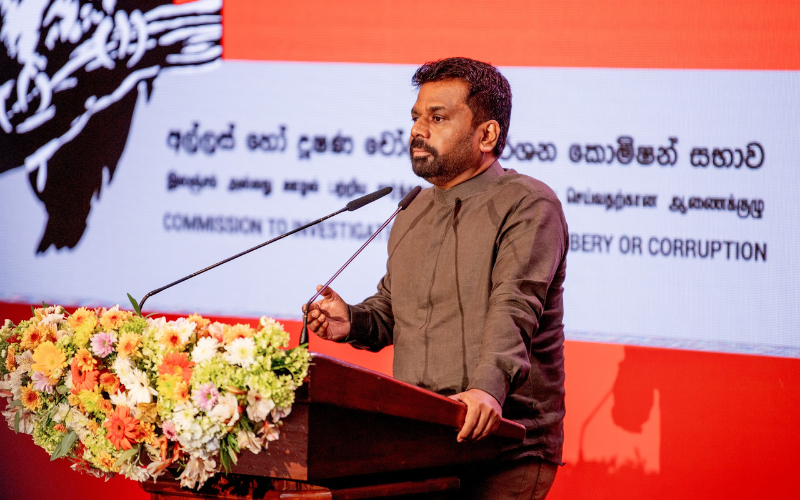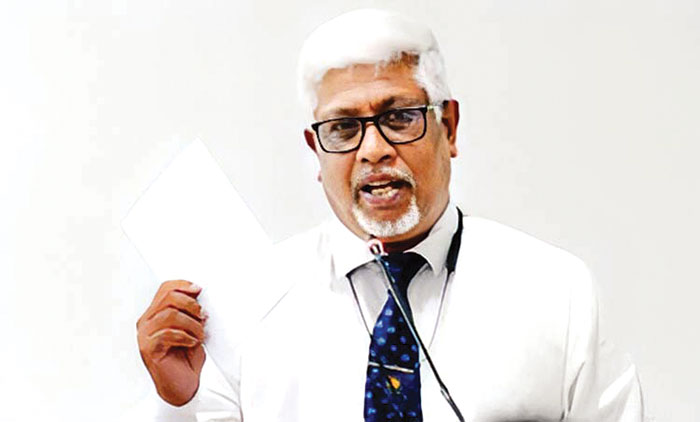News
Military assistance may be sought to execute warrants if police fail to make arrests

DSG Peiris demands police upgrade their representation in court
By Shamindra Ferdinando
The Attorney General’s Department is willing even to consider securing assistance of the military to execute warrants issued by courts following submissions made by the department, if the police are unable to make arrests.
Deputy Solicitor General (DSG) Dileepa Peiris said so addressing the media at the AG’s Department last Friday evening (31). Flanked by Additional Solicitor General (ASG) Sumathi Dharmawardena and State Counsel and AG Department spokesperson Nishara Jayaratne, DSG Peiris said the police could discuss difficulties experienced by officers in executing warrants, if any, with AG Dappula de Livera, PC.
DSG Peiris said that they could work out a mechanism in this regard. If required, the assistance of the military could be obtained, he said.
At the onset of the briefing, the first ever called by the AG’s Department, ASG Dharmawardena and State Counsel Jayaratne explained the decision to brief the media as regards the ongoing high profile case heard before the Negombo Magistrate court where now interdicted Superintendent of the prison there Anurudda Sampayo and three other employees were accused of cooperating with the drug dealers and the underworld. The AG’s Department swung into action after Acting IGP C.D. Wickramaratne countered accusations directed at the police on a special television programme.
DSG Peiris questioned the circumstances under which Chief Jailor of the Negombo Prison Upali Sarath Bandara and Second tier Jailor Nishantha Senaratne simply walked into the Magistrate court on July 29 seven days after the issuance of warrants. They were remanded until August 4
In addition to them, the other suspect jailor Prasad Kalinga Kaluaggala who had earlier surrendered to the CID was also remanded until August 4 as well.
On the instructions of the AG, DSG Peiris vowed to go flat out against those responsible for building a criminal empire within the Negombo prison. Declaring that the Negombo case was very special and a challenge to the judiciary and the law enforcement, DSG Peiris explained that the exposure of the underworld and Prisons officials nexus as a result of investigation conducted on February 13 and May 11 this year.
Disclosing various contraband including narcotics seized during raids, DSG Peiris pointed out how the Prisons authorities allowed a digital scale in hands of those dealing in drugs for obvious reasons. The second raid led to the recovery of a double door fridge, electric kettle and various other items, including food supplements, DSG Peiris said, adding that it was only the beginning. “We’ll conduct a major investigation. The AG’s Department secured warrants for the arrests of the four personnel after convincing the court of the need to do so.”€
The fourth suspect (Prasad Kalinga Kaluaggala) surrendered to the CID before the execution of the relevant warrant, the DIG said, while recollecting the high handed manner Chief Jailor Upali Sarath Bandara and Second tier Jailor Nishantha Senaratne walked into the witness box. The top official questioned how two wanted men arrived at the Negombo Magistrate court after having evaded the police for several days. DSG Peiris said that the police owed the AG and the public an explanation why the two suspects couldn’t be tracked down before they reached the court premises.
DSG Peiris said that the pathetic failure on the part of the police to execute warrants sent wrong signal to the public. Recent threats directed at the President, the Secretary, Ministry of Defence as well as the Commissioner General of Prisons by a criminal held at the Boossa prison should be examined against the backdrop of the alleged nexus between the underworld and those supposed to ensure law and order. The DSG emphasized the need to ascertain how criminal held in maximum security prison enjoyed such exclusive power even to challenge the President.
Responding to a query, DSG Peiris stressed that they didn’t have any problem with the Acting IGP and other law enforcement officers.
The DSG said: “The AG’s Department enjoyed excellent working relationship with the police. However, we cannot turn a blind eye to what was going on.â€
DSG Peiris rapped police headquarters for not assigning senior officers to represent the department in high profile cases such as the Negombo prison and the alleged involvement of a group of Police Narcotics Bureau (PNB) sleuths dealing in heroin.
DSG Peiris asked why a Senior DIG, DIG or IGP himself couldn’t represent the police in high profile case as he in his capacity as the DSG represented the AG in the lowest court. The police top brass should provide the required leadership in the battle against the underworld. DSG Peiris said that a group of five represented the AG’s Department at the Negombo Magistrate court whereas the police were represented by an ASP.
He Peiris emphasized that they couldn’t allow the unacceptable situation to continue under any circumstances. If the police couldn’t carry out court directives, the police top brass should explain the difficulties so remedial measures could be taken, in consultation with relevant parties.
Responding to allegations that the AG’s Department had been in an unnecessary hurry and too hasty in criticizing the police, DSG Peiris said that they weren’t engaged in what the critics called media shows. DSG Peiris reiterated that Acting IGP should be held responsible for the failure on the part of the police so far to arrest Sampayo as well as other accomplices now in remand after having walked into the Negombo Magistrate’s court.
DSG acknowledged the services rendered by law enforcement officers even at the risk of their lives whereas a minority among the 87,000 strong police department bring the entire service into disrepute.
Responding to another query, DSG Peiris compared government authorities securing the custody of Dubai-based Makandure Madush in May 2019 and Kumaran Pathmanathan alias KP in August 2009 with Sampayo arriving at Hulftsdorp court complex to sign an affidavit, after the issuance of warrant for his arrest. The DSG pointed out that Sampayo had been represented by a President’s Counsel and 15 other lawyers. Where were the police, an irate DSG asked.
The Acting IGP should explain what was going on and his department’s failure to execute the relevant warrant.
Referring to Negombo prison and PNB cases, DSG Peiris said that those genuine crime fighters lacked real friends and required backing whereas the underworld received unhindered support and assistance of the majority. DSG Peiris asserted that it was a very unfortunate situation.
The DSG said that his department would go all out to find out who provided refuge to Sampayo and his assistants as the exposure of those providing cover to wanted men was as important as apprehending the fugitives. DSG Peiris said that there was provision in the law to move court against law enforcement officers who failed to execute warrants.
The Deputy Solicitor General explained that the AG enjoyed the power to initiate an inquiry of his own even without receiving a complaint. He praised the role played by both print and electronic media in highlighting the Negombo case. If not for the media, those interested parties could have easily suppressed the case, the DSG said, urging the media to continue with their good work.
Responding to another query, DSG Peiris said that no one was above the law while emphasizing the need to inquire into alleged involvement of some elite Special Task Force (STF) personnel with the underworld.
Regardless of the consequences, the AG’s Department was determined to bring those high profile cases to a successful conclusion, DSG Peiris said, pointing out that he could have simply allowed the police to ask for additional time from the Negombo Magistrate when the case was taken up on July 22. Alleging that was the norm, the DSG said that the AG’s Department felt the need to take a tough stand “on this issue as our very existence was at stake.
Latest News
Enforcing the law against bribery and corruption is not an act of political revenge but a profound human responsibility – President

President Anura Kumara Disanayake emphasized that since assuming office, the current government has taken decisive steps to free the process of combating bribery and corruption from political interference. He reiterated that while the political mechanism has been liberated from engaging in such crimes, it is now the responsibility of the administrative machinery operating beneath that political structure to fall in line and correct its course without delay.
He explained that a grace period of six months has already been provided for the state officials to adjust to this new direction. The President firmly warned that if the public service mechanism fails to act appropriately within this period, the government will not hesitate to take firm legal action against those officials from May onwards.
President Disanayake expressed these views on Wednesday (09), participating in the launch of the National Anti-Corruption Action Plan 2025–2029, held at the Bandaranaike Memorial International Conference Hall (BMICH) in Colombo.
Bribery and corruption have proliferated, undermining the integrity and values of the country’s state institutions .He observed that over the past six months of the present government, no section of the public service has been allowed to collapse and that if officials continue to resist change, the government will proceed to remove and replace them after May.
The President pointed out that bribery and corruption have caused the nation to fall behind for decades in the eyes of the world. He reiterated that enforcing the law against these crimes is not an act of political revenge but a profound human responsibility.
The President stressed the need to build a society that respects the law and fears wrongdoing, adding that conducting lectures or workshops alone would not suffice in achieving this goal. He emphasised that people must practically witness that any person who commits a crime will be subjected to punishment under the law.
President Disanayake noted that corruption in Sri Lanka ranges from minor bribery, from the village level to bringing poor quality medicinal drugs. Bribery and corruption have escalated from minor instances to grave financial crimes, extending from local councils to looting the Central Bank.
The President further said that previous rulers safeguarded and protected those engaged in corrupt activities.
He also revealed the emergence of a network of thieves within several state administrative institutions and certain bodies responsible for enforcing the law, comprising underworld elements involved in bribery and corruption. He confirmed that these criminal networks have already been identified and assured that measures will be implemented in the future to dismantle and eliminate them.
President Disanayake solemnly pledged that the responsibility of eradicating bribery and corruption will not be passed on to the next generation but will be resolved within this generation itself, under the leadership of the present government.
Drawing a comparison with India, which gained independence a year before Sri Lanka, the President noted that through a consistent national policy framework, India has successfully achieved space exploration and built a massive workforce in the software industry. In stark contrast, he pointed out that Sri Lanka, due to poor decisions made by its political leadership, was declared a bankrupt state in 2022.
He further stated that the current government has taken on the responsibility of leading Sri Lanka towards the international stage through a national policy framework that ensures transparency and accountability for every rupee spent from public funds.
The President added that by implementing this framework, it is possible to build public trust in law enforcement and judicial institutions and that it must be made clear to the people that there will be no mechanism available for anyone to escape the law after committing a crime.
He stated that the purpose of the National Anti-Corruption Action Plan 2025-2029 is to guide the country towards becoming a nation of integrity. The government plans to establish Internal Affairs Unit within all state institutions including the Presidential Secretariat and implement a system for monitoring these units through digital technology to ensure accountability and transparency.
The Action Plan has been designed around four key strategic priority areas: prevention and public participation, institutional strengthening and the enforcement of law along with reforms in law and policy.
The President highlighted that eliminating bribery and corruption is one of the most decisive factors in a country’s development and progress. In Sri Lanka, the Commission to Investigate Allegations of Bribery or Corruption (CIABOC) has been identified as the leading state institution entrusted with strengthening this mechanism. Accordingly, it was recognised that a robust national anti-corruption policy that operates across all sectors is essential to creating a corruption-free society.
In preparing this Action Plan, CIABOC engaged all relevant stakeholders by conducting extensive programmes at both national and provincial levels. A broad public consultation process was carried out, including a comprehensive survey to assess public opinion on corruption through media announcements in all three languages and via social media networks.
This process gathered proposals from a diverse range of participants, including Members of Parliament, judges, state officials, the private sector, international organisations, civil society organisations, community-based organisations, religious groups, persons with special needs, media professionals, youth, children and the general public. Additionally, foreign state experiences and suggestions from various groups across all provinces were taken into consideration when formulating the Action Plan.
By implementing this National Anti-Corruption Action Plan, the government hopes to foster a committed citizenry determined to combat corruption, a political will fully supportive of this effort, a comprehensive legal framework and a disciplined, transparent public service across all sectors, with the shared vision of building a country of integrity for future generations.
Addressing the event, the Japanese Ambassador to Sri Lanka, Hideaki Mizukoshi, stated that Corruption remains a great challenge for many countries, including Sri Lanka as it undermines economic growth, weakens public trust in government institutions and discourages foreign investment. However, he noted that due to the reform initiatives of the present government, investors are once again showing increasing interest in Sri Lanka.
Ambassador Mizukoshi further stated that Japan has always believed that transparency and good governance are fundamental pillars for sustainable economic development and therefore, has supported anti-corruption initiatives globally for over a decade.
Meanwhile, the UNDP Resident Representative in Sri Lanka, Ms. Azusa Kubota, stated that according to Sri Lanka’s first-ever National Taxpayer Perception Survey conducted last year, 84% of respondents indicated that corruption directly affects their willingness to pay taxes.
She further noted that corruption deters investment, increases the cost of doing business, undermines sustainable development and human security, and causes an estimated annual loss of USD 1.3 trillion for developing countries.
Referring to the Budget Speech delivered by the President, Ms. Kubota emphasised that the State must be accountable for every cent of taxpayers’ money and stated that this Action Plan would serve as a roadmap for transforming Sri Lankan society.
The event was attended by the Chief Justice, Supreme Court Justice Murdu Nirupa Bidushinie Fernando; the Attorney General, Parinda Ranasinghe PC; the Secretary to the President, Dr. Nandika Sanath Kumanayake; the Chairman of CIABOC, former High Court Judge Neil Iddawela; the Director General of CIABOC, R.S.A. Dissanayake; the Commanders of the Tri-Forces; the Inspector General of Police; senior officials from the security forces and a large number of state officials.
Latest News
Sun directly overhead Hatthikuchchi, Kalankuttiya, Halmillewa, Ipalogama, Palugaswewa and Habarana at about 12:11 noon. today [10]

On the apparent northward relative motion of the sun, it is going to be directly over the latitudes of Sri Lanka during 05th to 14th of April in this year.
The nearest areas of Sri Lanka over which the sun is overhead today (10th) are Hatthikuchchi, Kalankuttiya, Halmillewa, Ipalogama, Palugaswewa and Habarana at about 12:11 noon.
News
LG elections to be staggered

Signs are clear that the local government (LG) elections, originally scheduled for 06 May, will have to be held on a staggered basis, as nomination lists in respect of about 200 out of 339 LG institutions have been challenged before the Court of Appeal, according to sources.
Those who have filed cases in the Court of Appeal seek writs against holding the elections. The final date for filing cases is 21 April.
By yesterday only 113, out of 339 local government bodies, had been cleared for the 06 May elections, with no rejections of nomination lists, or objections, sources said. The nomination lists for 226 local government bodies have been rejected, and candidates on these rejected lists are entitled to file cases against the Election Commission (EC) until 21 April.
The Court of Appeal (CA) has ordered that some of the lists rejected by the Election Commission be accepted. However, the EC is planning to challenge all CA orders before the Supreme Court.
When contacted for comment, Director General of the Election Commission, Saman Sri Ratnayake, told The Island that all arrangements had been made to hold the elections on 06 May, in accordance with the provisions of the Local Authorities Elections (Amendment) Act No. 16 of 2017.
“We will hold elections to the local government bodies for which there are no legal barriers, and this will depend on the final decision of the courts,” Ratnayake said, adding that elections to other local government bodies would be held on later dates.
By Saman Indrajith
-

 Business4 days ago
Business4 days agoColombo Coffee wins coveted management awards
-

 Business6 days ago
Business6 days agoDaraz Sri Lanka ushers in the New Year with 4.4 Avurudu Wasi Pro Max – Sri Lanka’s biggest online Avurudu sale
-

 Features5 days ago
Features5 days agoStarlink in the Global South
-

 Business7 days ago
Business7 days agoStrengthening SDG integration into provincial planning and development process
-

 Business6 days ago
Business6 days agoNew SL Sovereign Bonds win foreign investor confidence
-

 Features2 days ago
Features2 days agoSri Lanka’s Foreign Policy amid Geopolitical Transformations: 1990-2024 – Part III
-

 Features5 days ago
Features5 days agoModi’s Sri Lanka Sojourn
-

 Midweek Review2 days ago
Midweek Review2 days agoInequality is killing the Middle Class




















